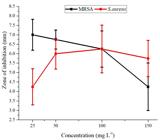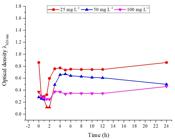Abstract
The emergence of antibiotic resistance in microorganisms is a serious challenge globally. Natural hydrophobic diterpene carboxylic acids present in rosin have unsatisfactory inhibitory properties against pathogens due to their poor water solubility. Therefore, the objective of research work was to modify the natural rosin into rosin maleic anhydride adduct with improved bioinhibitory properties for methicillin-resistant Staphylococcus aureus (MRSA). Prescreened MRSA isolates were found 78.05% and 29.27% resistant to oxacillin and vancomycin antibiotics respectively. The dosage effect of 0, 25, 50, and 100 mg L-1 rosin maleic anhydride adduct revealed the best inhibition response at 25 mg L-1. Moreover, bacteriostatic as well as the inhibitory effect of rosin maleic anhydride adduct was noticed against MRSA isolates. Gompertz model predicted better uptake of maleic anhydride adduct as compared to rosin. The higher specific growth rate of MRSA at reduced lag time correlated with increased toxicity of maleic anhydride adduct. This research concludes rosin maleic anhydride adduct has superior inhibitory properties against MRSA strains.
Keywords:
drug resistance; growth kinetics; growth inhibition; MRSA; rosin maleic anhydride adduct

 Thumbnail
Thumbnail
 Thumbnail
Thumbnail
 Thumbnail
Thumbnail
 Thumbnail
Thumbnail
 Thumbnail
Thumbnail




